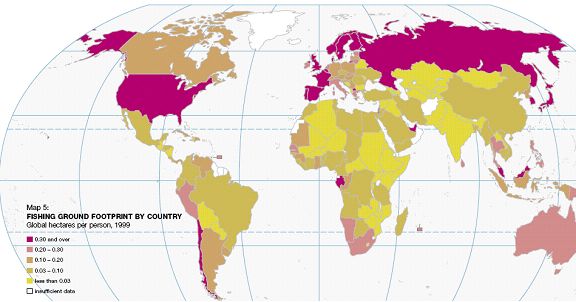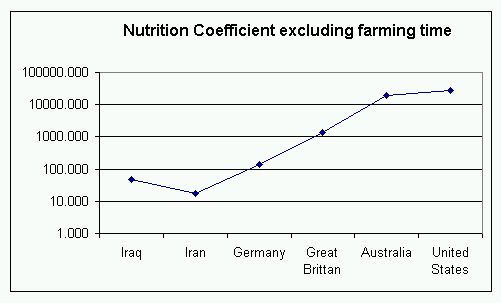Diet and Terror
Could the Middle Eastern diet be responsible for radical terrorism, perpetual poverty, and a generally self-destructive culture?
Michael Tulloch, an Experimental Psychologist at the University of South Dakota, thinks so.
According to Dr. Tulloch, “Back in the 1930s the United States Department of Agriculture was concerned about the loss of minerals in US farm land. The Middle East has been occupied by humans and intensively farmed for six to eight thousand years compared to only two hundred years in the US. It seems likely that this continuous agriculture has severely depleted the soil. Animals grazing on this land will also be depleted in nutrients essential for normal human development.”
Is there evidence to support his views?
The LiveScience article Something Fishy: How Humans Got So Smart(Complete article), describes the potential value of fish in the human diet. Stephen Cunnane, a metabolic physiologist at the University of Sherbrooke in Quebec presented his research Saturday, February 18, 2006 at the annual meeting of the American Association for the Advancement of Science. “Even today, many people are dependent on shore-based foods. And it's possible, Cunnane speculates, that diets which aren't based on the ancient tradition put us at grave risk.
“Deficiencies in iodine and iron—minerals rich in a fish diet—can lead to cognitive degeneration. That's why companies added iodine to salt starting in the 1920s.
"’We're still vulnerable when we're not consuming that vitamin-rich diet,’ Cunnane told LiveScience. … If you take away the fuel, the brain suffers."
Contrast this article with the information contained in a recent NIH article. There, David B. Adams, Ph.D. reports the results of his study suggesting an association between greater seafood consumption and lower rates of bipolar disorders. The most precipitous rise in prevalence rates for the bipolar disorders generally occurs in countries having a seafood consumption of less than 50 lb per person (per year). (Am J Psychiatry 2003;160:2222-2227.)
Additional research shows young adults exposed to an enriched, stimulating environment during childhood may be at decreased risk for schizophrenia and criminal behavior. The enrichment program emphasized a stimulating environment and focused on three key elements-nutrition, education, and physical exercise. Program participants scored lower on tests of schizotypal personality and antisocial behavior at age 17 years and were less likely to have a history of criminal behavior. The strongest benefits were seen among children with evidence of malnutrition at age 3 years. The findings may be particularly relevant to poor rural areas of the US...and also to US inner cities, where rates of both malnutrition and behavioral problems in children are relatively high. (Am J Psychiatry 2003;160:1627-1635. As found here.)
In another study, the adjusted mean MacArthur Comprehension score was significantly higher for children whose mothers consumed fish four times/week compared with those children whose mothers did not consume fish. The results indicate that a relationship exists between fish consumption by mothers during pregnancy and development of verbal and communication abilities in children. Even moderate fish consumption seems to have positive effects on children’s development (Daniels et al., 2004).
The availability of fish for human consumption can be found in AAAS articles (for example: Natural Resources and Waste) and in World Wildlife Fund Reports (for example: Living Planet Report 2002). Availability is assumed to be highly correlated with consumption for a given country. However, those countries with a large tourism industry may have consumption estimates skewed toward the tourist country of origin.
Never the less, the following map makes a striking statement. Access to fish alone is a fairly good predictor of wealth and civilization while lack of access to fish is a predictor of poverty and terrorism.

Dr. Tulloch proposes a formula that creates a nutra-deficiency coefficient. This coefficient can be found by multiplying [Cropland/person] by [Grazing Land] by [Fishing Grounds/person] by [the inverse of Years of Agriculture] by [Per Capita Income].
The first three factors of this formula relate to the availability of the three primary sources of foods: grain/vegetables, animal, and fish. The fourth factor is a stand in for measured soil depletion. The final factor attempts to adjust the coefficient for wealthy countries’ ability to purchase nutrition resources beyond their local capabilities.
It is difficult to evaluate how to scale the depletion factor - inverse of Years of Agriculture. Values vary from 8000 years for the Fertile Crescent to 200 or so years for North America and Australia.
Similarly, there appears to be no a priori scale for “Per Capita Income” which also has a large range.
Therefore, nutra-coefficient values were computed without the factors for Farming History and Per Capita Income. A nutra-coefficient was calculated for six representative countries yielding the following chart:

By simply combing crop and grazing land availability with the availability of fish, areas of the world with lower scores are found to be the source of today’s terrorism. Note the extreme value range in the above chart.
A Nutra-Coefficient can be calculated for nearly any country using values available in the WWF report referenced above or the USA's CIA Fact Book.
Related Links:
Michael Tulloch, an Experimental Psychologist at the University of South Dakota, thinks so.
According to Dr. Tulloch, “Back in the 1930s the United States Department of Agriculture was concerned about the loss of minerals in US farm land. The Middle East has been occupied by humans and intensively farmed for six to eight thousand years compared to only two hundred years in the US. It seems likely that this continuous agriculture has severely depleted the soil. Animals grazing on this land will also be depleted in nutrients essential for normal human development.”
Is there evidence to support his views?
The LiveScience article Something Fishy: How Humans Got So Smart(Complete article), describes the potential value of fish in the human diet. Stephen Cunnane, a metabolic physiologist at the University of Sherbrooke in Quebec presented his research Saturday, February 18, 2006 at the annual meeting of the American Association for the Advancement of Science. “Even today, many people are dependent on shore-based foods. And it's possible, Cunnane speculates, that diets which aren't based on the ancient tradition put us at grave risk.
“Deficiencies in iodine and iron—minerals rich in a fish diet—can lead to cognitive degeneration. That's why companies added iodine to salt starting in the 1920s.
"’We're still vulnerable when we're not consuming that vitamin-rich diet,’ Cunnane told LiveScience. … If you take away the fuel, the brain suffers."
Contrast this article with the information contained in a recent NIH article. There, David B. Adams, Ph.D. reports the results of his study suggesting an association between greater seafood consumption and lower rates of bipolar disorders. The most precipitous rise in prevalence rates for the bipolar disorders generally occurs in countries having a seafood consumption of less than 50 lb per person (per year). (Am J Psychiatry 2003;160:2222-2227.)
Additional research shows young adults exposed to an enriched, stimulating environment during childhood may be at decreased risk for schizophrenia and criminal behavior. The enrichment program emphasized a stimulating environment and focused on three key elements-nutrition, education, and physical exercise. Program participants scored lower on tests of schizotypal personality and antisocial behavior at age 17 years and were less likely to have a history of criminal behavior. The strongest benefits were seen among children with evidence of malnutrition at age 3 years. The findings may be particularly relevant to poor rural areas of the US...and also to US inner cities, where rates of both malnutrition and behavioral problems in children are relatively high. (Am J Psychiatry 2003;160:1627-1635. As found here.)
In another study, the adjusted mean MacArthur Comprehension score was significantly higher for children whose mothers consumed fish four times/week compared with those children whose mothers did not consume fish. The results indicate that a relationship exists between fish consumption by mothers during pregnancy and development of verbal and communication abilities in children. Even moderate fish consumption seems to have positive effects on children’s development (Daniels et al., 2004).
The availability of fish for human consumption can be found in AAAS articles (for example: Natural Resources and Waste) and in World Wildlife Fund Reports (for example: Living Planet Report 2002). Availability is assumed to be highly correlated with consumption for a given country. However, those countries with a large tourism industry may have consumption estimates skewed toward the tourist country of origin.
Never the less, the following map makes a striking statement. Access to fish alone is a fairly good predictor of wealth and civilization while lack of access to fish is a predictor of poverty and terrorism.

Dr. Tulloch proposes a formula that creates a nutra-deficiency coefficient. This coefficient can be found by multiplying [Cropland/person] by [Grazing Land] by [Fishing Grounds/person] by [the inverse of Years of Agriculture] by [Per Capita Income].
The first three factors of this formula relate to the availability of the three primary sources of foods: grain/vegetables, animal, and fish. The fourth factor is a stand in for measured soil depletion. The final factor attempts to adjust the coefficient for wealthy countries’ ability to purchase nutrition resources beyond their local capabilities.
It is difficult to evaluate how to scale the depletion factor - inverse of Years of Agriculture. Values vary from 8000 years for the Fertile Crescent to 200 or so years for North America and Australia.
Similarly, there appears to be no a priori scale for “Per Capita Income” which also has a large range.
Therefore, nutra-coefficient values were computed without the factors for Farming History and Per Capita Income. A nutra-coefficient was calculated for six representative countries yielding the following chart:

By simply combing crop and grazing land availability with the availability of fish, areas of the world with lower scores are found to be the source of today’s terrorism. Note the extreme value range in the above chart.
A Nutra-Coefficient can be calculated for nearly any country using values available in the WWF report referenced above or the USA's CIA Fact Book.
Related Links:
Kids' Asthma Linked to Maternal Nutrition
Labels: agriculture, brain, cognition, diet, food, grazing, health care, middle east, soil, terror


4 Comments:
Organic Farmers also support this view.
http://www.focusas.com/Nutrition.htm
http://www.planetnatural.com/site/xdpy/kb/grow-organic.html
http://www.healthychild.com/database/whole_foods_for_healthy_kids.htm
www.library.umass.edu/spcoll/digital/tnf/2005.01.pdf
I agree that diet is a large factor, but I disagree it is THE largest factor by itself. Other basic needs such as housing play a role as well. I believe that the diet fits into the basic needs thoery very well. I also believe that a wholistic view is almost always best and linking a problem as big as this to just one cause is unrealistic.
Oh, I wouldn't disagree that other factors contribute to the problem. However, I would argue that brain development is KEY to intervention. If brain development is negatively altered by diet, then no other intervention approach is capable of providing remediation.
IN UTERO HEALTH MAY AFFECT LIFE'S SUCCESS, August 07
U.S. scientists have determined prenatal health has a significant
influence on a person's lifetime economic success.
Full story at http://www.physorg.com/news74187236.html
Post a Comment
<< Home